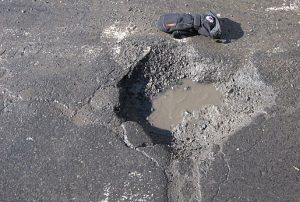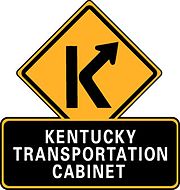 Mayor Greg Fischer today helped launch the 2017 edition of the Pothole Blitz conducted annually by Metro Public Works. During the blitz, to recover from damage caused by the multiple freeze/thaw cycles of winter, Public Works crews go through the city’s streets in a grid pattern patching potholes until all roads are covered.
Mayor Greg Fischer today helped launch the 2017 edition of the Pothole Blitz conducted annually by Metro Public Works. During the blitz, to recover from damage caused by the multiple freeze/thaw cycles of winter, Public Works crews go through the city’s streets in a grid pattern patching potholes until all roads are covered.
Mayor Fischer noted that the number of potholes is expected to continue a decline begun last year thanks to increased investment in paving and consecutive mild winters. Potholes peaked at 171,000 in 2015 following years of deferred road maintenance and a rough winter. But they are expected to total less than 50,000 in 2017.
Potholes can be reported to Metro Public Works here and other drivers can be warned and pothole information can be shared on the Operation Fill Louisville Potholes Facebook page.
The Mayor and Metro Council boosted spending on paving from just $2.8 million in 2014 up to $20.9 million in 2016. As a result, the number of miles paved increased from 26 in 2014 to 131 in 2016. Newly repaved roads are less susceptible to the formation of potholes.
Also this year, Public Works is adding $250,000 worth of new equipment that will help patch potholes faster and more effectively. For instance, vibrating walk-behind plate compactors are replacing handheld compactors to do a better job of pressing newly laid asphalt into place.
Mayor Fischer urged citizens to participate in the blitz by reporting potholes to MetroCall in one of three easy ways. Those using the social network Twitter can use the hashtag 502pothole. Include the hashtag along with the address or nearest intersection of the pothole location in any tweet, and MetroCall will get the message.
The same goes for a pothole reporting form that can be found at the top of the city website, Louisvilleky.gov. Click on the “Report a pothole” link, put in the location information and press send. “We believe government works best in collaboration with citizens,” the Mayor said. “The Twitter and website reporting tools are just another way to make city government even more responsive and easy to work with.” People can also call MetroCall at 311 or 574-5000. The 502pothole hashtag and the online form offer the advantage of avoiding the potential for having to wait on hold on the telephone.
Public Works patches potholes on Metro Government maintained roads. Potholes on interstate highways should be reported to the Kentucky Transportation Cabinet at 1-877-For-KYTC (367-5982).
Hunter brings vast leadership and government experience to KYTC
 Kentucky Transportation Cabinet (KYTC) Secretary Greg Thomas today announced the appointment of Dr. Noelle Hunter as Executive Director of the Kentucky Office of Highway Safety (KOHS).
Kentucky Transportation Cabinet (KYTC) Secretary Greg Thomas today announced the appointment of Dr. Noelle Hunter as Executive Director of the Kentucky Office of Highway Safety (KOHS).
“Dr. Hunter brings a vast wealth of knowledge and life experience to the KOHS,” said Sec. Thomas. “Combined with her passion and dedication to helping others, we believe she is a true asset to the Cabinet.”
The KOHS is responsible for providing traffic safety grant funding to law enforcement agencies and educational programs to schools and communities in an effort to reduce crashes, injuries and fatalities on Kentucky roadways.
Prior to joining the KYTC, Hunter was the Director of College Readiness and an instructor of Developmental Reading at Morehead State University. During her decade in higher education, Hunter served as a professor of state and local government, American political institutions and international relations at Morehead State, West Virginia University and West Virginia Wesleyan University.
In 2014, Hunter testified before the U.S. Senate Committee on Foreign Relations on the problem of international parental child abduction. Hunter successfully recovered her daughter from abduction to Mali that same year with support and resources from her home community of Morehead, her native state of Alabama, and from Congress, the U.S. Department of State and the U.S. Department of Justice. Hunter co-founded iStand Parent Network Inc. to empower parents to return their children from abduction and currently serves as president of the board of directors.
In 2003, Hunter served as the James E. Webb Fellow for the Smithsonian Institution Office of Policy and Analysis and worked in constituent services for the former Sen. Jay Rockefeller, of West Virginia. Prior to federal service, Hunter was the Walter Rollins Scholar for the West Virginia Legislature Committee on Health and Human Services and committee staff for the subcommittees on Homeland Security and Bioterrorism; and Workforce, Innovation and the New Economy—responsible for identifying threats and contingency plans to protect West Virginia’s critical infrastructure.
Hunter worked as a media relations executive for Public Communications, Inc. in Chicago and coordinated learning opportunities for underserved, urban youth from 1995-2000.
“The essence of the KOHS mission is to help people live as they travel our beautiful Commonwealth,” said Hunter. “It’s a great privilege to work in a Cabinet where this is our focus.”
Hunter earned a Bachelor of Science degree in journalism in 1994 and a Masters of Public Administration in 2009 from Ohio University. She earned her Ph.D. in Political Science from West Virginia University in 2007.
Hunter has lived in Kentucky for 11 years and has three daughters, Rachel, Rysa and Muna.
“Pause-50” plan aims to restore funding back to normal operating levels
 Kentucky Transportation Cabinet (KYTC) Secretary Greg Thomas today testified before the Interim Joint Committee on Transportation about the condition of the Road Fund cash balance—the funding source for all Cabinet operations including construction, maintenance and general support.
Kentucky Transportation Cabinet (KYTC) Secretary Greg Thomas today testified before the Interim Joint Committee on Transportation about the condition of the Road Fund cash balance—the funding source for all Cabinet operations including construction, maintenance and general support.
In his testimony, Sec. Thomas detailed the seriousness of a low Road Fund cash balance and introduced the Cabinet’s “Pause-50” plan to restore funding back to normal operating levels.
“For the first time in recent history, the Cabinet faces a low Road Fund cash balance, which compromises our ability to authorize new state road projects over the next biennium,” said Sec. Thomas. “The “Pause-50” approach is designed to slow or delay the starts of new projects so that we can pay current expenditures, recoup lost revenue and rebuild our funding base.”
Based on the KYTC’s cash management plan, the Cabinet strives to have a balance of at least $100 million at any given time. The last time the cash balance neared zero was in 2004 when it hit $30 million.
Consequently, the Cabinet will implement the “Pause-50” plan by halting the starts of new state-funded projects in all phases, which includes design, right of way/utilities, and construction for the first year of the biennium; and in the second year, aim for a goal of $50 million to allocate on state-funded projects starts.
In essence, the Cabinet will “pause” adding new state-funded projects for the first year in the biennium. For the second year, the Cabinet anticipates the availability of $50 million for state-funded projects starts. The dollar amount could be higher or lower depending on actual expenditures of current projects and the flow of state revenue funding.
In March, Sec. Thomas gave legislators a brief overview of the situation and identified several critical factors that have contributed to the low cash balance—mainly, overspending with limited funds.
State spending has greatly exceeded revenues since Fiscal Year 2014. Road Fund revenues totaled $4.5 billion over FY 2014-2016. Over the same period, expenses totaled $5.035 billion, exceeding revenues by $498 million; meaning that the start of new state funded projects must be delayed in order to meet payment of current expenditures as well as restoring the $100 million cash balance threshold. Continue reading
 Weather
Weather Traffic
Traffic @LouisvilleDispatch
@LouisvilleDispatch @LouisvilleDisp
@LouisvilleDisp Subscribe
Subscribe
